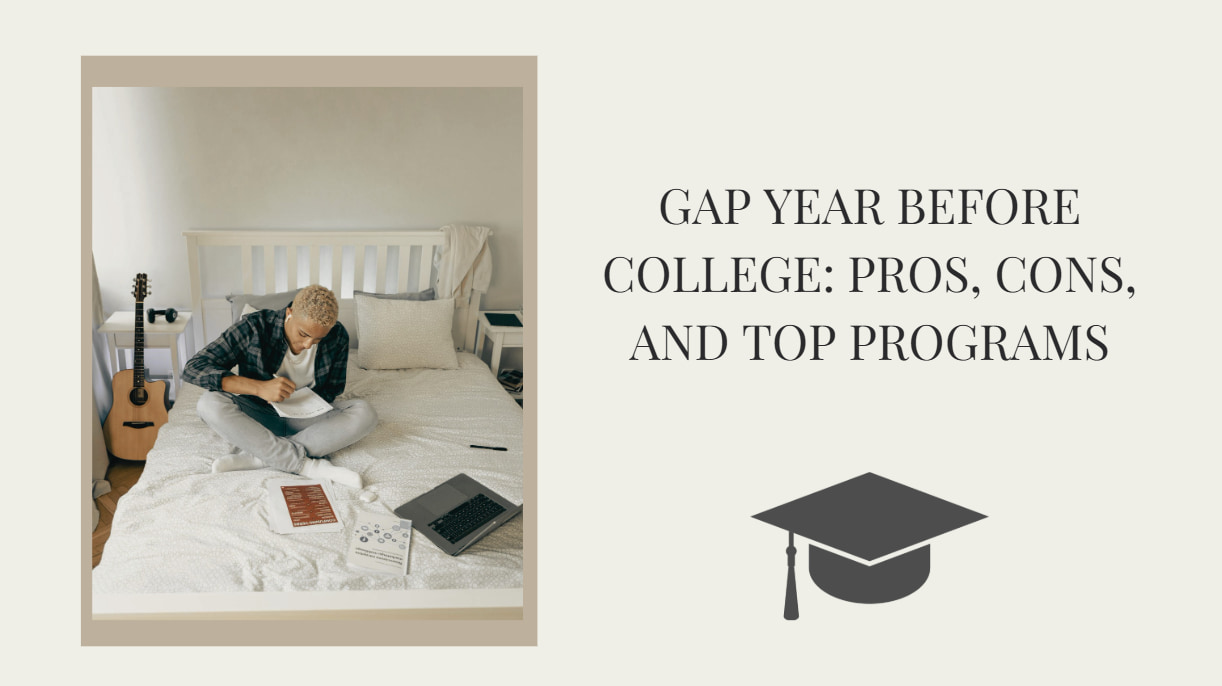When I chat with students about taking a gap year before college, I can always tell they’re feeling a mix of excitement and nerves. Some love the idea of gaining life experience, while others worry about falling behind.
As an admission consultant, I can say that a gap year before college can be a smart move if you go into it with a plan. This time off is your chance to do something meaningful that will make your college experience and future career even stronger.
What Is a Gap Year Before College?
A gap year is basically a planned break between finishing secondary school and starting your first year of college. Instead of jumping straight into classes and assignments, many students take this time off between high school and college or university to work, volunteer, or pick up new skills.
For example, I’ve seen students spend this year learning a new language, starting creative projects, or testing out career paths they’re interested in.
In my opinion, a gap year before college is about taking time to reset and grow. After years of academics, this break gives you a chance to recharge and figure out what you really want.
By the time freshmen year rolls around, most students who pursue a gap year are more confident, focused, and ready to get the most out of their year of college.
What Are the Benefits of Taking a Gap Year Before College?
More and more colleges and universities allow admitted students to defer enrollment for one year. Why? Because when gap year students take a year to focus on themselves, they usually come back to campus for the fall semester more mature, motivated, and ready to take on college life.
So, let’s go over the biggest benefits.
✅ Personal Growth and Independence
One of the biggest perks of taking a gap year between high school graduation and college is the chance for personal growth. When you step away from the usual classroom routine, you learn how to manage your own time, set goals, and push yourself in ways that secondary school never required.
I’ve noticed that prospective students who take this break often enter college with a stronger sense of direction.
✅ Real-World Experience
It’s a chance to work, volunteer, or travel—experiences that really help you see the world differently. Some students considering a gap year use it to pick up skills that tie directly to their majors or future careers.
Even Harvard encourages this, and plenty of Harvard students say their gap year shaped their mindset in the best way.
✅ Better Academic Focus
When students take a year to recharge, they usually come back with a fresh perspective and a stronger work ethic.
After years of non-stop school, a gap year allows you to rest and figure out what you really want from your degree-granting program at another college or university.
✅ Opportunities for College Credit or Programs
Some gap year students join structured programs that let them earn college credit while traveling or learning new skills. This year allows you to stay academically engaged while still getting unique experiences outside the classroom.
✅ Financial Benefits and Aid
Taking a gap year doesn’t mean losing your financial aid. Many colleges will roll your aid package over if you defer enrollment for one year.
Plus, working during this time can help you save money before starting higher education.

Disadvantages of Taking a Gap Year Before College
There are some clear disadvantages that students considering taking a gap year should keep in mind.
From my experience as a college admission consultant, a poorly planned gap year can create challenges that affect your timeline for earning a college degree or even your motivation.
❌ Losing Academic Momentum
One big disadvantage is falling out of the habit of studying. After taking a semester or a year off, it can be tough for incoming first year students to jump back into the rhythm of lectures, assignments, and exams. Once the classes of the semester start, you might feel like you’re a bit rusty compared to students who went straight to college.
❌ Applying to College Can Be Tricky
If you’re still applying to college during your gap year, juggling applications and essays while traveling or working can get stressful.
Even if students defer their matriculation to the college, most schools require a gap year deposit and a clear outline of what they’ll be doing. I always tell students to check with their college counselors to make sure everything is in order.
❌ Money Can Be a Problem
Let’s be real—taking a gap year can cost a lot. Whether it’s traveling, volunteering, or signing up for programs, the expenses add up quickly.
Schools like Portland State University may let you defer without losing your spot, but you still need to think about how this gap year fits into your budget for a college degree.
❌ Falling Behind Peers
Another disadvantage is feeling like you’re starting late. When your high school friends are already adjusting to dorm life and the fall semester, you might feel left out.
This is something students considering taking a formal gap year really need to think about—college will still be there, but you’ll be joining later than your classmates.
Best Gap Year Programs Before College
The best programs help you grow, learn new skills, and start your first year of college with more focus and confidence.
Some students love international programs like EF Gap Year or CIEE because they mix language learning, travel, and cultural exchange. Others are drawn to service-based programs such as Global Citizen Year or AMIGOS de las Américas, where you can work on real projects that make a difference while building leadership skills.
Below are a few types of programs worth checking out:
- Travel and cultural exchange (EF Gap Year, CIEE)
- Service and volunteer work (Global Citizen Year, AMIGOS)
- Outdoor and adventure trips (High Mountain Institute, Outward Bound)
- Career-focused or skill-based programs (Year On, TeenLife favorites)
The main thing is to pick something that fits your goals and budget while still sounding fun to you. A well-chosen program can turn your gap year into an experience you’ll talk about for years—and it might even give you an edge when college starts.
Should I Take a Gap Year Before College?
Thinking about taking a gap year before college? Honestly, it’s a personal choice, but it can be a really good move if you know how you want to use that time. A gap year is just a break for recent high school graduates, and many students take time to work, travel, volunteer, or simply figure out what they want next.
One of the biggest perks is getting a mental reset. Let’s be real—after years of classes, tests, and college applications, most seniors feel worn out. Having a year to breathe, gain work experience, or even learn something new outside of the classroom can give you a clearer idea of what you want from your first year of college.
Of course, a gap year isn’t always the best choice. Some people find it hard to jump back into studying after a long break, and if you don’t plan your year well, it might feel like wasted time. Plus, while your friends are starting their year of college, you might feel like you’re falling behind.
So, ask yourself these questions:
- Am I looking for personal growth or work experience?
- Will this make me feel more ready for my freshman year?
- Do I have a solid plan for how I’ll spend the year?
If you’ve got good answers to those, it could be exactly what you need to start college with more energy and focus.
Is It Bad to Take a Gap Year Before College? Final Thoughts
Taking a break isn’t “bad” at all—it just depends on how you use that time.
Colleges usually like seeing students use that time to do something meaningful within the gap year, like work, volunteer, or learn new skills. It can even give you great stories to share once you start your first year. The only real downside is if you spend the year doing nothing, which can make it harder to get back into school mode.
Not sure if a gap year is the right call? Check out BestCollegeAdmissionConsultants.com. There are many experts who can help you figure out your application timeline and make a plan that works, even if you’re taking time off.

